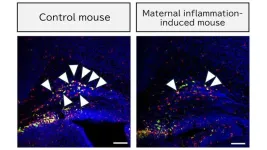(Press-News.org) A research group led by Nagoya University Graduate School of Medicine in Japan has uncovered a potential mechanism linking maternal inflammation to delayed neurodevelopment in infants. The research suggests the role of CD11c-positive microglia—immune cells in the brain crucial for myelination—during infant brain development. The results, published in Communications Biology, suggest new strategies to mitigate the long-term neurodevelopmental effects of maternal inflammation.
Inflammation during pregnancy occurs when the mother’s immune system becomes activated during pregnancy, typically due to an infection, autoimmune response, or environmental factors. It can have negative outcomes for the baby, potentially causing long-term cognitive and behavioral challenges.
Now, a research team led by Kazuya Fuma and Tomomi Kotani has discovered the role of CD11c-positive microglia in this process. Microglia, the brain's immune cells, play a key role in myelination, the process where nerve fibers are coated with myelin. Myelin is essential for making the nerve cells able to transmit electrical signals efficiently.
First, the researchers tested mice that were exposed to maternal inflammation. They found that the proliferation of these cells was reduced. Then, to determine if these findings were relevant to humans, the researchers analyzed cord blood from preterm infants exposed to chorioamnionitis, a condition that causes inflammation during pregnancy. They found lower levels of IGF-1, a protein linked to CD11c-positive microglia, in their samples. When they performed MRI of the infants, the scans confirmed that they had a higher incidence of delayed myelination.
“Inflammation during pregnancy suppressed the increase in CD11c microglia that we usually see during typical infant development,” Fuma said. “CD11c microglia have been reported to be involved in myelination by being a major source of IGF-1. In the present study, both were decreased in inflammation during pregnancy, suggesting that this pathway is impaired in children with delayed neurodevelopment.”
This study sheds light on the complex relationship between maternal inflammation and neurodevelopment. The researchers hope that understanding the role of CD11c-positive microglia in neurodevelopment will lead to new therapeutic strategies.
“If future studies confirm a decrease in these microglia in preterm infants exposed to inflammatory conditions, such as chorioamnionitis, early interventions could be developed to prevent or reduce the neurodevelopmental impact of maternal inflammation,” Fuma said. “By targeting CD11c-positive microglia, it may be possible to protect infants from the long-term consequences of impaired myelination and improve their chances for healthy cognitive development.”
END
An immune cell may explain how maternal inflammation causes neurodevelopmental disorder
2025-04-01
ELSE PRESS RELEASES FROM THIS DATE:
New study refocuses research on mysterious falcon decline
2025-04-01
North America’s smallest falcon, the American Kestrel (Falco sparverius), has declined across the continent since the 1970s, yet the causes continue to stump raptor biologists. A new study published in the Journal of Raptor Research adds a piece to the puzzle with the discovery that in the Northeast, where declines are most alarming, fledglings demonstrate a relatively high survival rate. This paper, titled “Juvenile and Adult Survival Estimates of American Kestrels Throughout the Full Annual Cycle in Eastern North America,” is the first of its kind. No other study has assessed winter survival ...
Omega-6 fatty acid promotes the growth of an aggressive type of breast cancer
2025-04-01
Linoleic acid, an omega-6 fatty acid found in seed oils such as soybean and safflower oil, and animal products including pork and eggs, specifically enhances the growth of the hard-to-treat “triple negative” breast cancer subtype, according to a preclinical study led by Weill Cornell Medicine investigators. The discovery could lead to new dietary and pharmaceutical strategies against breast and other cancers.
In the study, published March 14 in Science, the researchers found that linoleic acid can activate a major growth pathway in tumor cells by binding to a protein called FABP5. Comparing breast cancer subtypes, the team observed that this growth pathway activation ...
FAU secures $1.3 million NIH grant for breakthrough in HIV self-test technology
2025-04-01
As of the end of 2023, nearly 40 million people worldwide were living with HIV, including approximately 1.2 million in the United States. In the same year, about 630,000 people globally died from AIDS-related illnesses. Although this is a significant decline from previous years, AIDS-related deaths remain a critical global health challenge.
While antiretroviral therapy (ART) has improved the life expectancy of people with AIDS, a lack of effective diagnostics and disease management tools has hindered its global implementation. Only 59% of those in need have access to treatment, and about one in four people living with HIV are unaware of their status. Additionally, ...
Study finds higher cardiac deaths in combined day-night heatwaves
2025-04-01
Cardiac deaths increase significantly during compound heatwaves—heatwaves where temperatures are elevated both during the day and overnight—according to a new study in JACC, the flagship journal of the American College of Cardiology. The study also found that some types of heart disease are more sensitive to heatwaves than others and that different types of heatwaves may impact heart health in distinct, nonlinear ways.
The research highlights the special risks of compound heatwaves ...
NYC, Baltimore research scientists receive grants to study cardiovascular/diabetes connection
2025-04-01
DALLAS, April 1, 2025 — A New York City-based physician scientist who explores ways to improve health by looking at the ways in which cells and molecules impact disease and an epidemiologist from Baltimore who has devoted her career to identifying ways to improve screening, diagnosis and patient care for people with diabetes are the most recent American Heart Association Merit Award recipients. Over the next five years, each researcher will receive a total of $1 million in funding from the Association, a global force changing the future of health for all.
The American Heart Association’s Merit Award is one of ...
AI propaganda: prolific and persuasive
2025-04-01
A study of the use of AI by a Russian-backed propaganda outlet shows how AI allows propagandists to increase their production capacity without any loss in persuasive power. In December 2023, journalists at the BBC and Clemson University’s Media Forensics Hub published an investigation revealing that the site DCWeekly.org was a Russian propaganda outlet, part of a broader network disseminating pro-Kremlin and anti-Ukrainian narratives. Morgan Wack and colleagues found that prior to September 20, 2023, much of the content on the site was simply lifted from other right-leaning outlets. After that date, however, the stories were generally rewritten by AI, allowing the site to use a broader ...
An efficient self-assembly process for advanced self-healing materials
2025-04-01
Polysiloxane materials, such as polydimethylsiloxane (PDMS)-based elastomers, exhibit a self-healing capability by the introduction of silanolate (Si–O–) groups. This ability stems from their dynamic siloxane (Si–O–Si) bonds, which can break and reform to repair damage. Their self-healing properties could make them valuable in applications like protective coatings for use in various fields, such as optics, electronics, and aerospace.
To improve the properties of PDMS-based materials, they have been combined with inorganic fillers such as nanoparticles or nanosheets. Generally, the introduction of nanosheets into polymers leads to the formation of ...
Study reveals stark racial disparities in IBD care across the united states
2025-04-01
New York, NY – April 1, 2025- A study published today in the American Journal of Gastroenterology reveals significant disparities in healthcare utilization among racial and ethnic groups with inflammatory bowel disease (IBD) in the United States. The research, funded by the Centers for Disease Control and Prevention (CDC), led by investigators from the University of Pennsylvania, the University of North Carolina at Chapel Hill, and the Crohn's & Colitis Foundation provides crucial insights into the challenges faced by underrepresented communities ...
Break the sedentary cycle: National Walking Day can kickstart healthier routines
2025-04-01
DALLAS, April 1, 2025 — Sedentary behavior has become a national health crisis, with 1 in 4 U.S. adults sitting for more than eight hours a day, increasing their risk for heart disease, stroke, and mental health challenges, according to the Centers for Disease Control and Prevention. To help people move more, the American Heart Association, a global force changing the future of health of all, invites communities nationwide to walk together on Wednesday, April 2.
Adopting healthier routines doesn’t have to be intimidating or overwhelming according to Eduardo Sanchez MD, MPH, FAHA, the ...
Researchers develop new way to match young cancer patients with the right drugs
2025-04-01
A pan-Canadian team has developed a new way to quickly find personalized treatments for young cancer patients, by growing their tumours in chicken eggs and analyzing their proteins.
The team, led by researchers from the University of British Columbia and BC Children’s Hospital Research Institute, is the first in Canada to combine these two techniques to identify and test a drug for a young patient's tumour in time for their treatment.
Their success in finding a new drug for the patient, described today in EMBO Molecular Medicine, shows how the study of proteins, known as proteomics, ...






